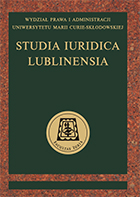Rozwód w prawie francuskim w latach 1792–1816
Divorce in French Law Between 1792 and 1816
Author(s): Piotr Zbigniew PomianowskiSubject(s): Constitutional Law, Civil Law, 18th Century, 19th Century
Published by: Wydawnictwo Naukowe Uniwersytetu Marii Curie-Sklodowskiej
Keywords: divorce; separation; French Revolution; Napoleonic Code;
Summary/Abstract: During the Ancien Régime in France, marriage was indissoluble and only separation was allowed. The Constitution of 1791 declared that marriage was only a civil contract (the principle of the indissolubility was rejected). The law of 1792 abolished separation and allowed to get a divorce, which was easily accessible – even incompatibility of temperament could be a reason for untying a marriage knot. During Robespierre’s rules, liberal law of 1792 was even more liberalized. After the Thermidorian Reaction, conditions of obtaining a divorce were tightened but the law in that matter was still liberal. It was not until the introduction of the Law of 1803, that the number of grounds for a divorce was limited. In 1804, the Law of 1803 became the part of the Code Civil.
Journal: Studia Iuridica Lublinensia
- Issue Year: 25/2016
- Issue No: 3
- Page Range: 767-782
- Page Count: 16
- Language: Polish

